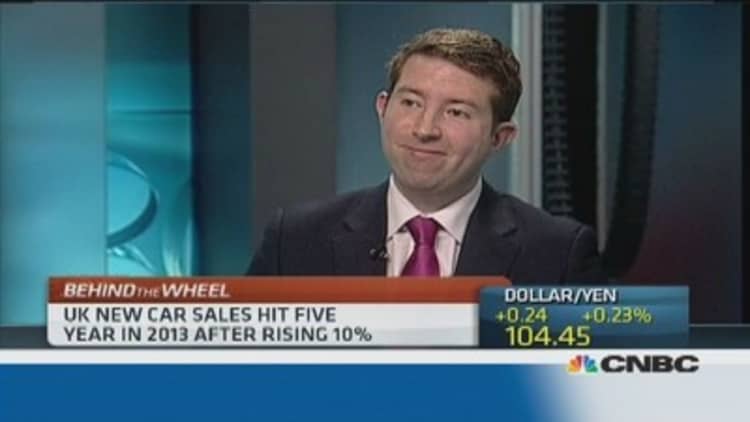
In a further sign of the U.K.'s recovery, British consumers are rushing to buy new cars, with spending levels back to their pre-recession best – in spite of the fact that wages have not caught up with the country's improving economic data.
New car sales in the country grew by 10.8 percent last year to hit a five-year high, according to figures from the Society of Motor Manufacturers and Traders (SMMT) released on Tuesday.
The organization said 2,264,737 vehicles were registered in 2013, exceeding forecasts. It marked the best sales volume seen in the U.K. since 2007 when sales hit 2,404,607 units. The figure was also over 16 percent higher than the low seen in 2011 of 1,941,253 units.
The U.K. is now Europe's second-largest car market after Germany, the company said in a press release, and predicted stabilization in 2014 with growth of around 1 percent compared to last year.
(Read More: Business optimismboosts hopes of solid UK growth)
"With its best year since a pre-recession 2007, the U.K. new car market has helped stimulate the country's economic recovery," said Mike Hawes, SMMT's chief executive in the report.
"The 10.8 percent increase in 2013 reflects the attractive financial offers available as well as increased demand for more technologically advanced new cars."
Ford was Britain's top-selling manufacturer for most of 2013, according to Reuters, with its Fiesta supermini and Focus models seeing success. General Motors' Vauxhall Corsa and Astra were near the top of the best-sellers list too, with Volkswagen, Nissan and BMW also enjoying strong sales.
"There's a lot of confidence coming back to consumer spending," Martyn Briggs, a senior consultant at market analysis firm Frost and Sullivan told CNBC Tuesday. However, Briggs pointed out that the strong growth in the U.K was from enterprise car purchases with just over half the market now taken up by business fleets.
This rise in spending looks to be at odds with wage inflation data in the country. For the last financial year, median gross annual earnings for full-time employees saw an increase of 2.1 percent year-on-year, according to the Office for National Statistics. This is below inflation, and has been for the last five years, meaning the spending power of U.K. citizens has been in a steady decline since the financial crash of 2008.
Previous research by the SMMT suggests that this boom in sales has been fueled by low interest rates and manufacturer support on finance packages. Added to this, it said that consumers could be using PPI mis-selling windfall payments, cash given back to customers from banks who unlawfully sold them insurance on deposits.
Figures released in November by the Finance & Leasing Association (FLA) showed that the number of new cars bought by U.K. consumers using dealer finance in September grew by 19 percent on the year.
Autos were the best performing sector across European benchmark stock indexes in 2013, with a rise of 37 percent. This comes after two difficult years for the industry in which stock performance has lagged against other sectors.
(Read More: Happy new year? More UK budget cuts ahead)
The U.K.'s figures continue to buck the trend when looking at the European Union as a whole. Passenger car registrations were down 2.7 percent in the first 11 months of 2013, according to the European Automobile Manufacturers' Association, compared to the year before. Italy, Germany and France continue to see weakness with Spain and the U.K. the standout gainers.
The biggest problem facing Europe's auto sector is overcapacity with factory car lots full of unsold cars. Briggs told CNBC that firms would need to concentrate on offering premium brands to win back profit margin. Dealing with overcapacity would be a tougher task, he said, with job cuts and structural changes being a "contentious issue".
"They have reduce," he said. "The question is, is it going to be enough?"
—By CNBC.com's Matt Clinch; Follow him on Twitter @mattclinch81


